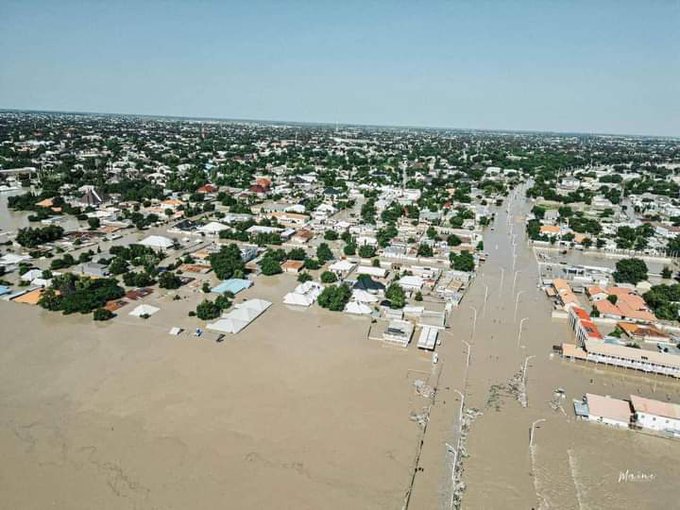‘Allahumma Ajirni Fi Musibati Wakhluf Li Khairan minha.’
‘O Allah! Compensate me for my calamity, recompense my loss, and give me something better instead of it.’
This has been our Du’a all week. From the moment I raised my phone and heard the sound of my normally calm sister crying, frantic with panic, it has been nothing but chaos, heartbreak and anguish.
Water, water, water, everywhere. Houses submerged with only the roofs visible. Cars swallowed whole. Bridges and roads no longer visible. People walking with their belongings on their heads- displaced with nowhere to go. Overhead bridges swarmed and overflowing with no where to stand. If before I wrote about people being hungry, now they are both hungry and homeless. Relatives that they would normally find succor with are also affected by the flood. One woman and her six children walked over 15km to our house thinking she could find refuge only to find that my family had also run for dear life. Staff working in UMTH were stranded because cars could not come in through the gate. And even if they could- the road network- Lagos Street, Gwange and Customs area were completely obliterated. The only thing they could do was climb upstairs (Luckily, UMTH has mainly two- and three-story buildings) and wait for the worst to be over.
People displaced. Overnight homeowners turned to IDPS. A three-bedroom house designed for a family of six suddenly became a haven for up to 45 people. My grandmother who lives in her comfortable house had to be evacuated to my sister’s place in the early hours of the morning. What to pack? My sister asked. I don’t know. Wait, take two days change of clothes. What else? Cash. Take cash and food. Cash is always handy. Suddenly it did not matter how much you had in the bank or how much you were worth. The only thing that mattered was ‘What do I need to survive? What can I take that won’t weigh me down?’
- Dangote donates N1.5bn to Borno flood victims
- Borno flood: Climate change, excessive rainfall responsible for Alau Dam overflow – FG
Loss. With the flood also came loss. Houses and businesses, wrecked. Markets and warehouses damaged. Food items ruined. Equipment worth billions of Naira destroyed within the twinkle of an eye. Medical equipment that took years of lobbying to obtain for UMTH, were consumed by the flood setting the hospital years back. Hospital beds, oxygen cylinders, medication and consumables all ruined. A video showing the office housing cold-chain storage of vaccines for the entire Borno State, completely destroyed. Someone who owned a furniture shop confirmed that his entire showroom worth millions were lost. Another businessman burst into tears when he was told that his cement worth up to N80 million was also gone.
Panic. Despair. Grief. Those of us not in Maiduguri were worried about our loved ones. The videos we watched scared us to death. Phones were not going through. Batteries died and there was no electricity. And of course, GSM providers used the flood to excuse their shabby network. I imagined the worst. Where was everybody? Why was no one picking their phone? What level was the water at now? Was it increasing? What about our domestic staff? What was the plan? Answer the damn phone!
My hair turned gray on that Tuesday alone.
With the water flood now behind us, we must now brace ourselves for the consequences. And boy, are they are many.
The multiple environmental consequences of flooding can directly affect the public’s health. For example, water sources will be contaminated with foecal material, or toxic chemicals, water or sewer systems can be disrupted, dangerous substances can be released (e.g., propane from damaged storage tanks), and solid-waste collection and disposal can be disrupted.
Floods are the leading cause of weather-related (or in this case, Alau dam breakdown due to negligence) infectious disease outbreaks such as hepatitis A, cholera and typhoid fever. These diseases cause diarrhoea and dysentery which will further strain the already overburdened healthcare system of the state. Additionally, receding floodwater creates stagnant pools of water, which provide the perfect breeding ground for mosquitoes, which will further worsen malaria transmission and other zoonotic diseases like leptospirosis.
And these are just the public health consequences; agricultural complications like crop destruction and food insecurity are very likely to happen. Mental health issues as well. People who lose fortunes and property will turn to substance abuse. Some will sink into depression.
What do we do? We brace up. NEMA has their work cut out for them. It is not by mere distribution of rice and beans. Elements to be considered in such public health surveillance efforts are 1) purification of drinking and cooking water; 2) disinfection of wells; 3) food safety (i.e., handling of food that may have come in contact with flood water or of refrigerated food after the interruption of electrical power); 4) sanitation and personal hygiene; 5) injury-prevention measures to be taken during the return to and cleaning up of flooded homes; 6) communicable diseases and vaccinations; 7) mosquito control; and 8) other hazards such as animals, chemicals, and swift-flowing water.
And as if the distress was not enough, my friend saw a snake in her compound yesterday. Someone sighted a crocodile. And the video of an Ostrich strolling majestically on the road in Maiduguri went viral!

 Join Daily Trust WhatsApp Community For Quick Access To News and Happenings Around You.
Join Daily Trust WhatsApp Community For Quick Access To News and Happenings Around You.


